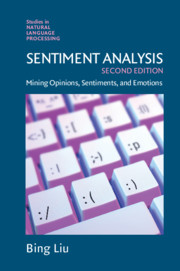Book contents
- Sentiment Analysis
- Studies in Natural Language Processing
- Sentiment Analysis
- Copyright page
- Contents
- Preface
- Acknowledgments
- 1 Introduction
- 2 The Problem of Sentiment Analysis
- 3 Document Sentiment Classification
- 4 Sentence Subjectivity and Sentiment Classification
- 5 Aspect Sentiment Classification
- 6 Aspect and Entity Extraction
- 7 Sentiment Lexicon Generation
- 8 Analysis of Comparative Opinions
- 9 Opinion Summarization and Search
- 10 Analysis of Debates and Comments
- 11 Mining Intent
- 12 Detecting Fake or Deceptive Opinions
- 13 Quality of Reviews
- 14 Conclusion
- Appendix
- Bibliography
- Index
1 - Introduction
Published online by Cambridge University Press: 23 September 2020
- Sentiment Analysis
- Studies in Natural Language Processing
- Sentiment Analysis
- Copyright page
- Contents
- Preface
- Acknowledgments
- 1 Introduction
- 2 The Problem of Sentiment Analysis
- 3 Document Sentiment Classification
- 4 Sentence Subjectivity and Sentiment Classification
- 5 Aspect Sentiment Classification
- 6 Aspect and Entity Extraction
- 7 Sentiment Lexicon Generation
- 8 Analysis of Comparative Opinions
- 9 Opinion Summarization and Search
- 10 Analysis of Debates and Comments
- 11 Mining Intent
- 12 Detecting Fake or Deceptive Opinions
- 13 Quality of Reviews
- 14 Conclusion
- Appendix
- Bibliography
- Index
Summary
Sentiment analysis, also called opinion mining, is the field of study that analyzes people’s opinions, sentiments, appraisals, attitudes, and emotions toward entities and their attributes expressed in written text. The entities can be products, services, organizations, individuals, events, issues, or topics. The field represents a large problem space. Many related names and slightly different tasks – for example, sentiment analysis, opinion mining, opinion analysis, opinion extraction, sentiment mining, subjectivity analysis, affect analysis, emotion analysis, and review mining – are now all under the umbrella of sentiment analysis. The term sentiment analysis perhaps first appeared in Nasukawa and Yi (2003), and the term opinion mining first appeared in Dave et al. (2003). However, research on sentiment and opinion began earlier (Wiebe, 2000; Das and Chen, 2001; Tong, 2001; Morinaga et al., 2002; Pang et al., 2002; Turney, 2002). Even earlier related work includes interpretation of metaphors; extraction of sentiment adjectives; affective computing; and subjectivity analysis, viewpoints, and affects (Wiebe, 1990, 1994; Hearst, 1992; Hatzivassiloglou and McKeown, 1997; Picard, 1997; Wiebe et al., 1999). An early patent on text classification included sentiment, appropriateness, humor, and many other concepts as possible class labels (Elkan, 2001).
- Type
- Chapter
- Information
- Sentiment AnalysisMining Opinions, Sentiments, and Emotions, pp. 1 - 17Publisher: Cambridge University PressPrint publication year: 2020
- 4
- Cited by

